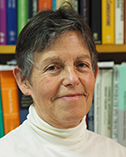
Odile Eisenstein
Universite de Montpellier
|
Primary Section: 14, Chemistry Membership Type:
International Member
(elected 2021)
|
Biosketch
Odile Eisenstein was born near Paris from Jewish parents from Lithuania and Romania. After a PhD with Nguyen Trong Anh and Lionel Salem at the University of Paris-Sud at Orsay, she went for post-doc with Jack Dünitz at the ETH Zurich and then with Roald Hoffmann at Cornell. She also was assistant professor at University of Michigan. In France, she was a CNRS research professor. She started at University Paris-Sud and in 1996 she moved to the University of Montpellier. Since 2012, she is adjunct professor at the University of Oslo. She also held several visiting professor positions in the US (Indiana, Texas A&M, Berkeley), in UK (Nottingham, York), in Israel (Technion). She holds several honorary doctorates. She is a member of the French Academy of Science, a foreign member of the Norwegian Academy for Science and humanities, a foreign member of North-Westphalia Academy. She is a member of the International Academy of Quantum Molecular Science and has been president since 2018. She was elected to the American Academy of Arts and Science a few days before being elected to the US National Academy of Science. She is officier de l’ordre du Mérite et de l’ordre la Légion d’Honneur.
Research Interests
Odile Eisenstein is a computational chemist who has worked in very strong symbiosis with leading experimental chemists to address questions on structures, properties and reactivity of complex molecular species. Her research concerns molecular organic and organometallic chemistry often with direct impact in homogeneous catalysis. Characteristically, she always interprets her results in terms that are familiar to the chemical experimental community and extracts concepts which could suggest new experiments. Some of her major achievements include: the first computational explanation of enantioselectivity, the successful prediction of the counterintuitive structure of d0 metal alkyls, MR6, the effect of agostic interactions on metal-carbon bonds, the understanding of the attractive interaction between metal hydrides and H-bond donors (the di-hydrogen bond), understanding the basis of the enormous NMR H-H coupling constants in some metal hydride complexes that arise through quantum mechanical tunnelling, overcoming the challenge of applications in reactivity of lanthanide complexes. the successful prediction of the effect of ortho-fluorine substituents on the strength of metal-carbon bonds, the role of the re-bound mechanism in C-H bond activation, the importance of outer-sphere processes in several catalytic mechanisms, the identification of unexpected rate-determining steps in olefin metathesis with direct predictive consequences on diastereoselectivity, the electronic origin of the shielding tensor for metal-bonded 13C NMR, relating NMR to molecular orbitals and reactivity, the unravelling of the mechanism of the Grignard reaction with appropriate representation of the solvent, thermodynamics and statistics.

